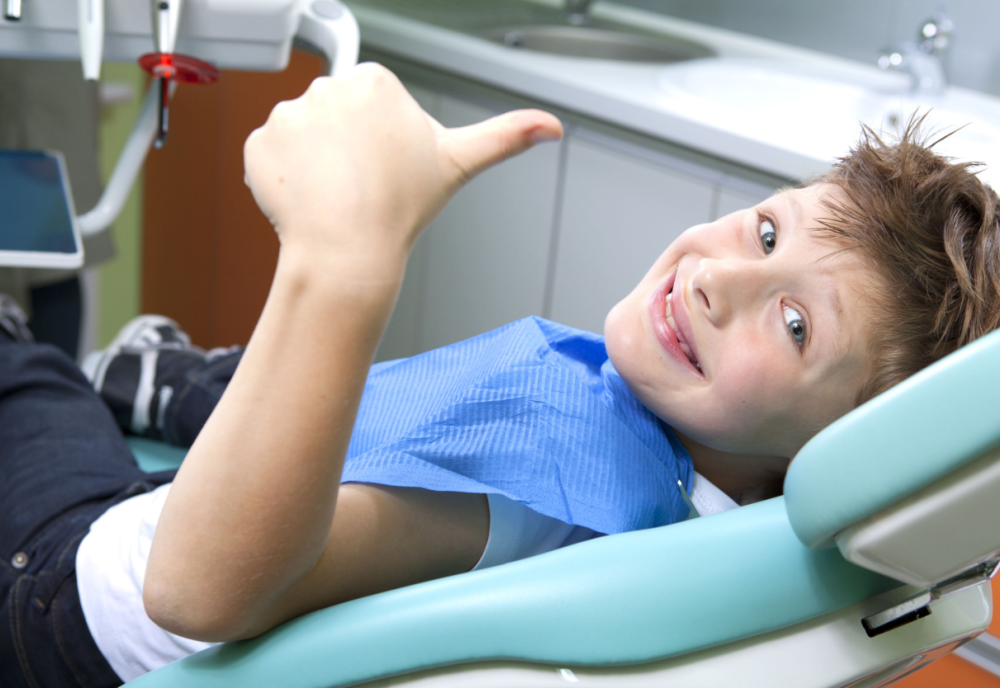Pediatric Dentist St. Ann, MO
Pediatric Dentist in St. Ann, MO. Martin Dental & Associates is committed to offering superior dental care services designed specifically for families residing in the Greater St. Louis area and St. Ann, MO. Understanding the demands of daily life, we prioritize convenience to ensure your child receives exceptional dental hygiene. Reach out to us through our contact page or give us a call at (314) 739-1222 for our Maryland Heights office or (573) 764-2425 for our Gerald location to book an appointment with our pediatric dentist.
At John Martin Dental, we strive to ensure that your whole family is taken care of for years to come. Our team is ready to welcome and service your family's and create a warm and welcoming, efficient environment for pediatric dentistry in St. Ann, MO.

Pediatric Dentists In St. Ann, MO | John Martin Dental
Why are St. Ann, MO, pediatric dentists crucial? Despite baby teeth being temporary, oral hygiene plays an essential role in a child's oral {health|health journey. St. Ann, MO, Pediatric dentistry involves a range, from infancy to late teens or even adulthood, ensuring comprehensive care. Healthy baby teeth are essential as they lay the foundation for strong, properly aligned permanent teeth. Since children rely on a mix of baby and adult teeth for several years, maintaining their baby teeth is crucial to prevent discomfort and ensure proper oral functions like biting, chewing, and speaking. Martin Dental & Associates now for more info on pediatric dentsits near St. Ann, MO.
Our services include the following:
Dental Hygiene | Martin Dental & Asssociates in St. Ann, MO
Let's control your dental hygiene. Below are a few tips for St. Ann, MO, pediatric mouth care:
- Start Early: Establish a foundation for dental health by delicately cleaning your baby's gums with a moist cloth after each feeding. As soon as their initial tooth emerges, initiate brushing with a small, soft-bristled toothbrush and a smear of fluoride toothpaste.
- Regular Dental Check-ups: Ensure your child's oral health by scheduling regular dental check-ups, ideally starting around their first birthday or when their first tooth appears. These early visits are essential for monitoring oral development and fostering a positive rapport with the dentist.
- Proper Brushing Technique: Teach your child proper brushing technique, including brushing twice a day for two minutes each time. Use fluoride toothpaste and supervise brushing until your child can effectively brush on their own, usually around age 6 or 7.
- Healthy Eating Habits: Educate your child on the correct brushing method, emphasizing the importance of brushing twice daily for two minutes each session. Use fluoride toothpaste and supervise brushing until your child develops the ability to brush effectively independently, typically around ages 6 or 7.
- Use of Fluoride: Guarantee your child's teeth remain strong and healthy by ensuring they receive sufficient fluoride. This can be achieved through fluoride toothpaste, fluoridated water, or fluoride supplements as advised by your dentist.
- Flossing: Instruct your child on the necessity of flossing every day to remove plaque and food particles from between teeth and along the gumline. Begin flossing once two teeth touch.
- Mouthguards: If your child plays sports or participates in activities with a risk of mouth injuries, consider using a mouthguard to protect their teeth and gums from trauma.
- Lead by Example: Show your children the importance of oral hygiene by practicing good dental habits yourself. When they see you brushing, flossing, and visiting the dentist regularly, they are more likely to emulate these behaviors and maintain their own oral health.
- Address Oral Health Concerns: Address any dental concerns promptly, including toothaches, cavities, or signs of orthodontic issues. Early intervention can prevent problems from worsening and ensure proper good dental habits.
- Positive Reinforcement: Praise your child for practicing good dental habits and makes dental care a positive experience. Use rewards or incentives to encourage regular brushing and flossing.

What Makes a Good Pediatric Dentist? | Martin Dental & Associates
Research shows that more than 35 percent of the U.S. population has fears about going to the dentist--this doesn't have to be the case. Don't hesitate to contact Martin & Associates for St. Ann, MO, pediatric dentists in the St. Ann, MO, area. Here are a few ways we can help:
- Specialized Training: Pediatric dentists undergo extra training after dental school to specialize in treating infants, children, and adolescents. This specialized education equips them with the expertise needed to address the unique dental needs of young patients.
- Child-Friendly Approach: A skilled pediatric dentist designs their office to be warm and inviting for children, incorporating colorful décor, toys, books, and other amenities to create a friendly atmosphere that puts young patients at ease.
- Patience and Empathy: Pediatric dentists prioritize the unique needs of children, ensuring that their dental experiences are positive and stress-free. They create a supportive environment where children feel heard, understood, and cared for throughout their dental appointments.
- Effective Communication: A pediatric dentist in St. Ann, MO, communicates effectively with both children and their parents or caregivers. They use age-appropriate language to explain dental procedures and oral hygiene practices so that they're easier to understand by children.
- Gentle Technique: {Pediatric dentists employ a gentle and reassuring approach during dental procedures for children, prioritizing their comfort and well-being to minimize discomfort and anxiety.|Pediatric dentists use a gentle and reassuring approach when providing dental care to children. They minimize discomfort and anxiety by employing techniques that prioritize the child's comfort and well-being.|When providing dental care to children, pediatric dentists utilize gentle and reassuring techniques, aiming to minimize discomfort and anxiety while prioritizing the child's comfort and well-being.|Using a gentle and reassuring approach, pediatric dentists prioritize the comfort and well-being of children during dental procedures, minimizing discomfort and anxiety to create a positive experience.
- Preventive Care Focus: {Exceptional pediatric dentists prioritize preventive dental care, emphasizing the significance of regular check-ups, cleanings, fluoride treatments, and dental sealants. They educate both parents and children on effective oral hygiene practices to prevent dental problems.|Good pediatric dentists emphasize the importance of preventive dental care, including regular check-ups, cleanings, fluoride treatments, and dental sealants. They educate parents and children about proper oral hygiene practices to prevent dental issues.|Quality pediatric dentists underscore the importance of preventive dental care, advocating for regular check-ups, cleanings, fluoride treatments, and dental sealants. They provide comprehensive education to parents and children regarding proper oral hygiene practices aimed at preventing dental issues.|Top-notch pediatric dentists stress the value of preventive dental care, highlighting the necessity of routine check-ups, cleanings, fluoride treatments, and dental sealants. They actively engage parents and children in learning about essential oral hygiene practices to avert dental problems.
- Flexibility and Adaptability: Pediatric dentists understand that each child is unique and may require different approaches to dental care. They demonstrate flexibility and adaptability in their treatment methods to accommodate the individual needs and preferences of each child.
- Positive Reinforcement: Pediatric dentists in St. Ann, MO, use positive reinforcement techniques, such as praise, encouragement, and rewards, to motivate children to maintain good oral hygiene habits and overcome dental fears.
- Comprehensive Care: A skilled pediatric dentist provides a variety of dental services specifically designed for children, covering routine exams, preventive care, restorative treatments, and specialized interventions such as interceptive orthodontics.
- Continuing Education: Pediatric dentists stay updated on the latest advancements and best practices in pediatric dentistry through continuing education and professional development. This ensures that they provide high-quality care using the most effective techniques and technologies available.
What to Expect With Your Child's First Visit to the St. Ann, MO, Pediatric Dentist's Office
It's important during the first visit to help kids feel comfortable within the office environment. Following a comprehensive exam to ensure that their primary teeth are healthy and developing well, we'll administer a flouride treatment. If your child is comfortable, we will introduce them to other procedures. Our pediatric dentists in St. Ann, MO, we maintain an Open Door Policy, welcoming parents to accompany their child during appointments. To ensure a positive experience and avoid confusion for your child, John Martin Dental & Associates requests that parents participate as silent supporters. It's our job to make sure your child's first visit to the dentist is enjoyable and interactive, fostering curiosity and providing entertainment such as TVs, tablets, and toys to make appointments something they eagerly anticipate.
We offer a range of services in St. Ann, MO, beyond severe tooth pain:
- Pediatric Dentist
- Cosmetic Dentistry Services
- Severe Tooth Pain
- Crowded Teeth
- All on 4 Dental Implants
- Chipped Tooth Repair
- Best Dentist Near Me
- Dental Surgeon Near Me
- Wisdom Teeth Surgery
- Invisalign
Do not hesitate to reach out to our St. Ann, MO, pediatric dentists at (314) 739-1222 for our Maryland Heights location or (573) 764-2425 for our Gerald location, or to contact us online.
